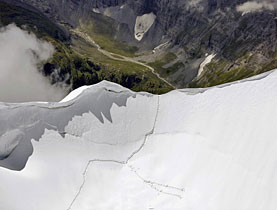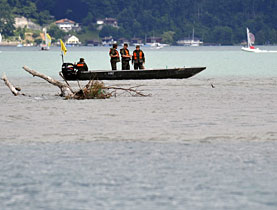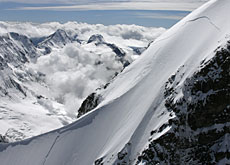Questions remain a year after Jungfrau tragedy

A memorial service has taken place in Andermatt for the six Swiss army recruits who died in a mountain tragedy a year ago.
Investigations are still continuing into the accident which occurred on the snow-covered flanks of the Jungfrau mountain on July 12, 2007.
Twelve soldiers belonging to a unit of mountain specialists, based in Andermatt, were climbing with two guides when tragedy struck.
In what was the military’s worst accident in 15 years, the six fell 1,000 metres to their deaths – probably carried away by an avalanche they triggered themselves. It had snowed in the area in the days before. Six soldiers and the two guides escaped unharmed.
In another accident involving the army last month, five soldiers were killed in a rafting accident on the River Kander near Wimmis, also in the Bernese Oberland region.
Asked when the Jungfrau investigation would be completed, Swiss army spokesman Christoph Brunner told swissinfo that this was not clear.
“I cannot tell you exactly because the military justice is leading the investigation and it is completely independent from the Swiss army.
“The point is that if the families of the victims or their lawyers want to see all the relevant files and ask the army questions, this is going to take time. It’s a matter of their right to look at the files.”
Charges
In October, Switzerland’s military justice launched a criminal investigation against the two mountain guides, with investigating judge Christoph Huber saying that given the relatively high avalanche risk and other factors, the decision to proceed with the climb was debatable.
And one father is pressing charges against three high-ranking army officers. They are the former army chief Christophe Keckeis, the former head of the land forces, Luc Fellay and the head of the Andermatt recruit school Franz Nager.
Questions about risk evaluation have been asked about both the Jungfrau and Kander dramas.
“The army is not taking too many risks. As far as the Jungfrau is concerned, what the soldiers did there was part of their job as mountain specialists. They did exactly what was part of their core competence,” Brunner said.
After the Jungfrau tragedy, experts from the Swiss Federal Institute for Snow and Avalanche Research in Davos were commissioned to determine the causes of the accident.
Avalanche
Their report said that the recruits died because of an avalanche, adding there was no other reasonable explanation.
The experts added their version of what happened did not contradict the testimony of one of the surviving soldiers, who thought one of the group had fallen taking the others with him.
“It is possible that those climbing at the rear of the group did not realise what started the avalanche,” added Jakob Rhyner, one of the institute’s experts.
Army spokesman Brunner said as far as the Kander accident was concerned, the investigation led by the military justice was still ongoing.
“But the head of the army, Corps Commander Roland Nef, said a week ago that the risk management must be very strict,” he said.
Poorly planned
A report into the Kander rafting accident found that the trip was poorly planned and the troops involved lacked the relevant experience.
Asked if it were not dangerous to be a member of Switzerland’s militia army, Brunner said this was not the case.
“We had a study from Suva – the Swiss Accident Insurance Fund – which said that in civil life, there are far more accidents than in military life. But of course, it is not fair just to give you the pure numbers. The army clearly states that every accident or incident is one too many.
“The army is clearly working to minimise risks on all levels but in general it is not possible to minimise them all to zero.”
swissinfo, Robert Brookes
The victims of the Jungfrau were all part of the Mountain Specialists Division 1 in the Swiss militia army.
To be accepted into the recruit school in Andermatt, members have to fulfil two conditions: completion of a special group leadership course in one of two fields: ski mountaineering or mountaineering; and obtain marks good to very good in the sport exams that are part of the three-day conscription to the army.
The main emphasis of training is on avalanche duties, mountain rescue techniques, survival in the mountains, and carrying out redeployment moves in the mountains.
June 12, 2008: five soldiers die in rafting accident on Kander river in Bernese Oberland, and five are injured.
July 12, 2007: six recruits die in an avalanche on the Jungfrau in the Bernese Oberland, the worst accident in 15 years for the armed forces.
October 12, 2001: an Alouette III helicopter hits a cable near Crans-Montana in canton Valais and crashes, killing all four people on board.
May 25, 2001: an Alouette III helicopter hits a cable near Delémont in canton Jura, killing the pilot and three border guards.
November 12, 1997: a Pilatus Turbo-Porter aircraft crashes during an exercise near Simmental in canton Bern. The pilot and four passengers die.
June 22, 1994: a civilian helicopter collides with a Swiss army Super Puma helicopter and crashes. A British couple and the pilot are killed.
April 27,1993: an army Pilatus Porter is caught up in high winds and flies into a cliff on the Finsteraarhorn in canton Bern. Three people die.
November 2, 1992: six people die when a munitions depot blows up near Susten in canton Bern.

In compliance with the JTI standards
More: SWI swissinfo.ch certified by the Journalism Trust Initiative


You can find an overview of ongoing debates with our journalists here. Please join us!
If you want to start a conversation about a topic raised in this article or want to report factual errors, email us at english@swissinfo.ch.